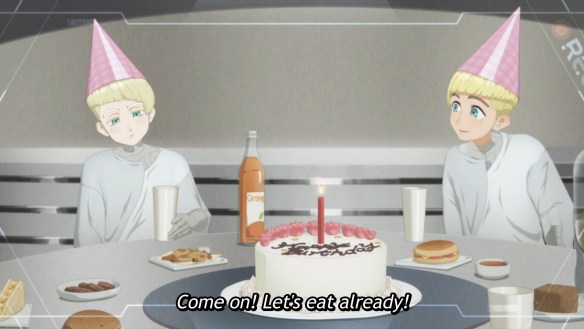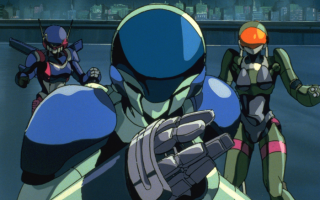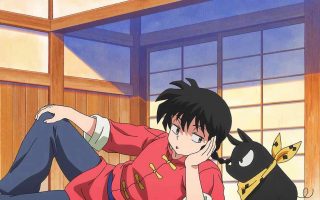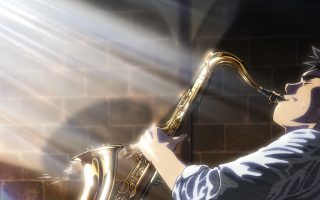Hello folks, and welcome back to Wrong Every Time. Today we’re returning to the dusty ruin of No Man’s Land, as we explore a fresh episode of Trigun Stampede. When we last left off, the team was racing to prevent a massive sand steamer from crashing through Wolfwood’s hometown, and destroying the orphanage that even his former handlers recognize as his sanctuary, his connection to humanity. With their backs against the wall, every member of our crew pulled off some desperate acts of heroism, culminating in Vash directly communicating with the living plant at the steamer’s core.
In terms of its overt action drama, that episode served as an impressive celebration of Orange’s advances in CG animation. Combining dynamic cinematography with careful design and texture work, it called towards the wild highlights of Land of the Lustrous while retaining a grittiness of aesthetic that is essential for Trigun’s overall effect. At the same time, the urgency and specificity of this trial is pushing all of our leads to reexamine their philosophies – the consequences of Vash’s unerring pacifism, the limits of Wolfwood’s alleged pragmatism, and even the responsibility of Meryl as not just chronicler, but active participant in these violent escapades. Stampede continues to embody all that is most compelling about Trigun, and I’m eager to see what new moral wrinkles this adventure will offer. Let’s get to it!
Episode 8
We open with an apparent flashback to the twins’ time aboard the arc ship, with our unseen caretaker declaring that this is their “first birthday” while capturing the scene with a video camera. Already we see the tension at play in this make-believe domesticity; the boys already appear perhaps nine years old each, and in spite of the caretaker’s attempt to insert levity into the situation, the whole scene looks uncomfortably sterile and contained. These boys do not fit within their world, and their world itself seems indifferent to human warmth
“Our Home” is a charged episode title – could the boys really consider this place their home? Is home a stable location, an idea, or even a person? As the show has taken care to demonstrate so far, we can generally find home anywhere we can find community, regardless of the deprivation of our circumstances
“You made food for me again. I don’t have to eat like Vash does.” Vash happily participates in this ceremony, while Knives loudly declares his otherness, refusing to pretend to be human
“Hey, I’m a plant, too.” Vash casually tossing off the revelation of last episode’s conclusion
“It doesn’t matter whether you eat it or not. It’s about making sure everyone gets a share.” It seems it was embracing this family that shaped Vash’s conscience, while Knives rejected it from the start. It doesn’t matter that Vash wasn’t born into this society; family is a practice, not a hard fact, and committing himself to that practice fundamentally changed Vash’s nature
And we see Rem at last, already reminiscing on this memory as she sits with the twins on an artificial field. Even this show’s flashbacks are preoccupied with their own past
Then a flash forward, back to the night of the crash. Over a long enough time period, memory becomes fragmentary, key moments isolated in the dark. Pictures and home videos fight the tide, giving us control over what we keep and remember, essentially helping us shape our retrospective life story
“You’re my accomplice. You’re the one who gave me the program access codes!” Both a moral weight Vash can never escape, and also an insinuation that Vash is fundamentally like Knives rather than like Rem. Fake birthday parties can’t change his nature
Knives always pushes the line with his affectation, leaning more towards the larger-than-life villains and heroes of Blood Blockade Battlefront. It definitely feels like there’s some tension between Nightow’s flare for melodrama and this production’s more sober dramatic intentions
You can see why Vash wears such heavy clothes – in just his robe, the tattoo lines across his body make his connection to the plants clear
Ooh, some nice compositions as Vash both literally and figuratively flees the ghosts of his past
Exhausted and wishing only for everything to end, he is rescued by a crew of human arc survivors
“Plants are usually cloned, but on rare occasions can give birth.”
“One of the Sinners in molecular plant studies.” Their terminology maintains the general religious motif, framing humans as sinners studying the angels
“Why did you save me? I wanted to die there.” “We’re only here because we got lucky. So we survivors can’t talk like that, even if we don’t mean it.” More formative influences for Vash, teaching him about the precious value of a life, even a life that seems hopeless
His savior’s name is Luida Leitner
“Unlike normal plants, I don’t create anything. All I do is eat, drink, and sleep.” Surely another source of self-doubt for Vash, but also perfectly appropriate for his character, given what he ultimately represents. Vash doesn’t produce a conventional resource, he produces kindness, safety, and an assurance that a better future is possible. Though he considers himself apart from humanity, he embodies and exudes humanity’s best qualities
“Right. Like a human.”
Though Rem is lost, some of her pictures survive, ensuring her vision of their childhood endures
And in his recovery of that talisman, Rem gives him something to live for. Her preservation of the past gives him the strength to pursue a new future
After a time, the survivors’ plant enters a state of distress, something Vash can apparently hear even from his cell. A reflection of his general “power” – his empathy, his ability to acutely feel the pain of others
“Rem trusted him. I do, too!” Once again, Rem’s lingering presence, the few fragments of intention she left behind, are enough to ensure Vash has a brighter future. It doesn’t take much to become essential to another person, to make a meaningful positive impact
“No matter the darkness you find yourself in, you’ll always have that ticket waiting for you to write in where to go.” Rem emphasizes the eternal possibility of reinvention, or redemption. A belief Vash would clearly take to heart, first for his own sake, and then in his attitude towards all the compromised, seemingly irredeemable wanderers of No Man’s Land
“I hear you. Don’t worry. I’m right here.” Vash’s literal ability to interface with and soothe these plants again echoes his general power: just being there, being a kind, considerate presence that is happy to share your emotional weight
The organization leading these arc ships appears to be called “SEEDS.” Makes sense, given they’re apparently attempting to seed life on new planets
“It was nothing. I just did what I could.” Vash’s words are contrasted against his fully eaten meal, the proof that he actually believes he is worthy of living again
And thus he joins Ship Three as an actual resident
He grows up traveling from arc to arc, reviving their plants and protecting their communities
“This is heaven compared to how things were after the crash.” Humanity was able to recreate heaven with their own hands. A line that oddly resonates with Knives’ decision, when he made Satan’s choice to rule in hell rather than serve in heaven
Luida gifts him his red coat, a shade that reminds him of Rem’s geraniums. The past continues to live on through his future connections
“This is my home.” And with that, he literally renames Ship Three. A clear textual affirmation that home is something we collectively create
Unfortunately, the decoding of Vash and Knives’ final conversation drives a rift between them, sending Vash fleeing into the desert
“It’s time for me to face that an Independent must make up for what an Independent did.” Another loaded phrasing, with Vash embracing the weight of his brother’s sins. Plus a bleaker interpretation of this episode’s persistent emphasis on the past’s continued existence, as Vash realizes he cannot escape Knives forever
And Done
Thus we learn the expanded tale of Vash’s escape from the wreckage, and his first attempt at redemption via his integration into the family of Home. I quite appreciate how this episode maintained a certain ambiguity in its framing, persistently emphasizing the cyclical, enduring nature of both faith and guilt, hope and regret. You could easily interpret Vash’s story here as an affirmation that we can’t truly change, or escape the weight of our past – but you could just as easily take it in a positive light, emphasizing how Vash has been able to make a home again and again, whether it’s among the arc survivors or new friends like Meryl and Wolfwood. If home is an ephemeral, collective vision, then so too is any alleged truth about our fundamental nature – and if Vash can cling to the faith Rem and Luida hold for him, then surely he can embody that faith in action.
This article was made possible by reader support. Thank you all for all that you do.




